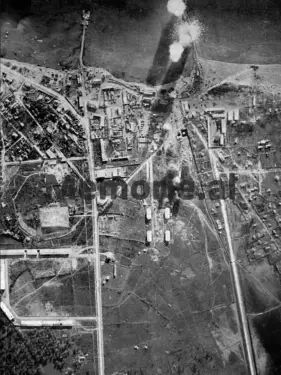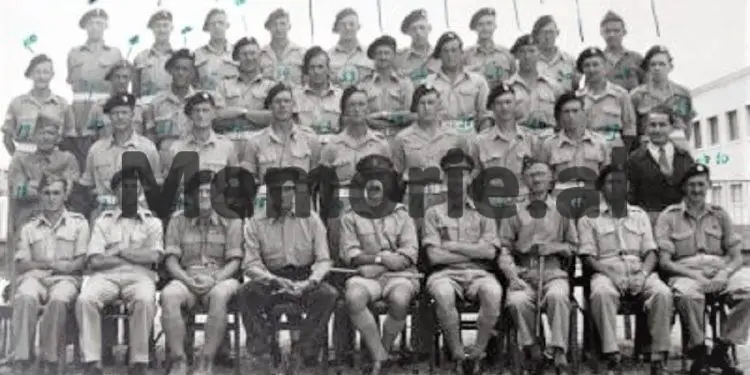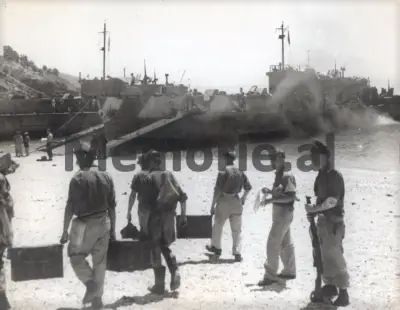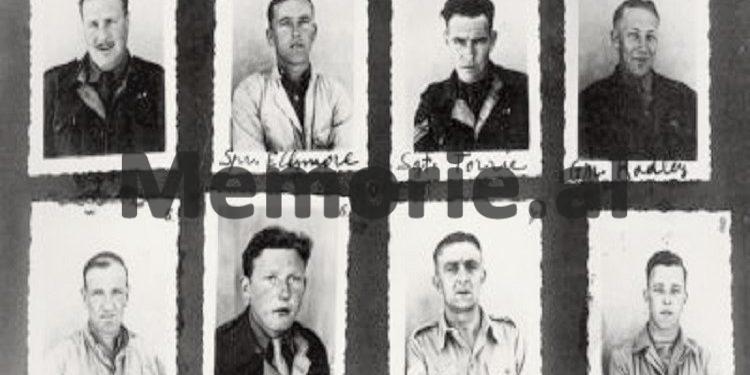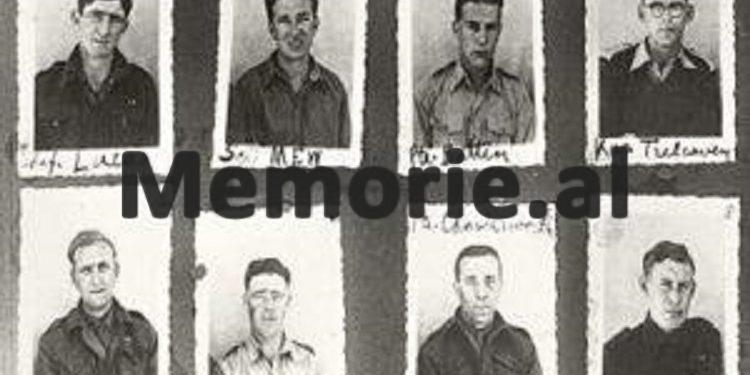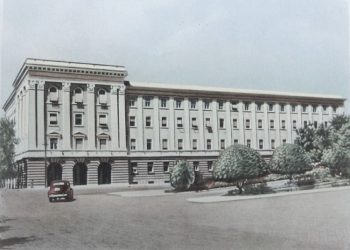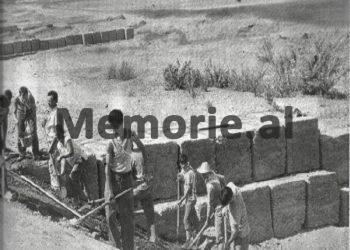By Lulzim Keta
Memorie.al / Due to the continuous political tensions between the Albanian communist government and the British government for over half a century, although times have changed, there is still a sense of oblivion about the contribution of the Allied troops during World War II, not only in supporting the Albanian partisans and nationalists, but also in giving their lives on the battlefields, for the liberation of two cities of Albania.
“It is true that the British participated in the battles that led to the liberation of Himara and Saranda,” says Tahir Çobani, a former partisan, who is now writing a book about the events of those years. “I participated in those battles and saw British soldiers being killed,” says Rakip Beqaj, another former partisan, a member of the military formation in which he was a member, the XII-Assault Brigade, which fought for the liberation of Himara and Saranda.
“But, due to the tense political relations between the Albanian Liberation Army Headquarters and the British forces envoys, cooperation in battles, especially in the liberation of Himara, was not satisfactory,” he adds. “I heard that there was a battle between the British and Germans here, during the war, but nothing more,” says Vasil Bollano, former mayor of Himara, a small coastal town 180 km. southwest of Tirana, the country’s capital.
British aid to Albania
During World War II, Albania was occupied by the Italians until September 1943 and then by the Germans until the end of 1944. To aid the Albanians’ efforts in their fight against the invaders, but given that the Albanians themselves were quite politically divided, the British government at the time sent its representatives to the Partisan General Staff, which was led by the communists, and to the nationalists, with the aim of supporting them with military materials and food, as well as instructing their armies, which were mainly composed of volunteers.
But while the British relations with the nationalists were good, those with the leaders of the National Liberation General Staff were strained. Enver Hoxha, at that time the political leader of the partisans, who later ruled the country for nearly 45 years, did not see his political future in cooperation with the British, having on the other hand the strong support for the future power from the communists in the region and especially the Yugoslavs.
In fact, at the end of his life, in the early 1980s, he wrote a book called “The Anglo-American Danger to Albania”, where the British, not only “did not contribute to the Second World War”, but “they constantly sabotaged the partisan war”. This book was not only part of the memoirs of the half-century ruler, but also a guide for all historians. No one could dare to write or say anything else.
Why did Enver Hoxha deny the contribution of the allies?
Enver Hoxha does not mention in that book that 54 members of the British forces gave their lives on Albanian soil and 18 of them were killed within three days, in the battles that led to the liberation of two cities in southern Albania. So have Albanian historians. “The partisan headquarters did not want to cooperate with us,” says Colonel Davis Smiley, the British government envoy, first for several months in 1943, to the partisans and then to the nationalists.
“I know that the partisan headquarters was asked to cooperate in capturing the heights and German positions, in Himara and then in Saranda, with the aim of preventing the future withdrawal of the Germans from Greece,” he says. “But they did not accept.” “We were aware of the British attack on the German positions, but we had orders not to act,” says Rakip Beqaj. “We were told that the British do not want our cooperation,” he adds, who was a simple partisan at the time.
He says that on the morning of July 29, 1944, the partisan forces had taken up positions throughout the mountainous area of Himara. And they had been ordered not to make any movements. “On the morning of July 29, the British forces began the attack from the sea, towards the German positions on the heights. The battle continued almost all day,” says Neim Malo, another partisan who witnessed the battle.
“Sometime in the afternoon the British troops withdrew. There were also killed among them. We immediately received the order to attack. The Germans, exhausted from the battle with the British, did not resist. Thus Himara was liberated”, – he adds. According to Tahir Çoban, a volunteer from the partisan forces was killed in that battle. “Six British people lost their lives in that battle”, – says Smiley. Five of the British who fell in that battle are members of the Highland Light Infantry regiment, while one is the Royal Norfolk Regiment.
Sore relations
The failure to cooperate in the battle of Himara soured relations between the British envoys and Enver Hoxha’s partisan headquarters. It was decided that in the coming months another battle would take place, in Saranda, 20 km. further south, but in cooperation between the two armies. “I was in Saranda months before this attack” – says Smiley. “I had to see the depth of the sea, the coastal area, and the possibility of moving our troops there,” he adds. According to Rakip Beqaj, in the battle for the liberation of Saranda, a joint Albanian-British commission was established to coordinate the actions of the two armies.
The plan was that the British would bombard the German positions with artillery, while the partisans would attack from the heights. On October 8, 1944, the attack on the German positions that were in really difficult hills began. The British bombardment of the German positions was heavy. “In fact, for the first two days the real battle took place between the two artillery pieces,” says Beqaj; “joint Albanian-British teams were moving in the field, coordinating the actions of the two sides in the fighting,” he says. On October 10, Saranda was liberated. More than 100 Germans agreed to surrender to the British.
“We do not know if there were any British casualties in this battle,” say the three former partisans who took part in that battle. But the Commonwealth War Graves Commission website states that 9 members of the British forces were killed in Albania on October 9, 1944, and 3 others were killed the day after. Five of the killed were members of the Royal Marines, 2 of the Royal Artillery, 1 was a Royal Engineer and a Somerset Light Artillery. The other three killed the day after were members of the Loyal Regiment and the Royal Marines.
“There may have been casualties among the British, but we did not know, because they attacked with artillery and the battle was between artillery,” says Beqaj. “It is true that in the Battle of Saranda, twelve members of the British forces were killed over two days,” says Davis. It seems that on this very day, the fate of the oblivion of the British fallen in Albania is decided. Enver Hoxha had designed the future system by which he would rule the country, so there was no need for the further presence of the British and their troops on Albanian soil.
Departure
After a week of tension, the British troops left the city. “Despite the tension that existed between the parties, due to the political struggle that was taking place in the headquarters, they (the British troops) were very correct,” says Rakip Beqaj. A year later, in 1945, David Smiley built a British Military Cemetery on the outskirts of Tirana. But in 1946, Enver Hoxha broke off all relations with the Americans and the English. His revenge also fell on the British cemetery in Tirana; he ordered its demolition. The crosses and the remains of the troops were placed in a mass grave, in an unknown location.
For nearly 40 years, no one spoke about them. The British government itself honored the fallen in Albania, in a memorial erected in Greece. Only in 1993, when communism had already fallen, after three consecutive visits to Albania, David Smiley met by chance an Albanian who had been the commander of the operation to destroy the British cemetery. After 1994, the cemetery was erected again on the outskirts of Tirana, a total of 54 graves, but few know what the reason for those graves in Albania is.
“We must act carefully”, – says Edmond Gjoka, former mayor of Saranda. “If it is true that the British also gave their lives for the liberation of the city, then it is our duty to do something for them”, – he adds. “If this event is true, they deserve a memorial”, – says Vasil Bollano, former mayor of Himara. “But you have to be very careful in these things, because you know, up until now history has been different. It takes time, work and people to clarify the truths,” he adds.
Ihsan Budo: English missionaries during the war
“I remember that, while two battalions of the 6th Assault Brigade were stationed in the Saranda area, Commissioner Haki Toska came to visit these forces. I accompanied Haki to all the places he went. One of his visits was to the Anglo-American military mission, whom operated in the First Operational Zone, whose command was located in Borsh, Saranda. The missionaries received us cordially and a long conversation was held with them, which consisted of our requests for the fastest possible assistance in weapons, ammunition, food and clothing, for the forces of the National Liberation Army.
The translation from English to Albanian and vice versa was done by Hiqmet Poshi. Later, I had working relations with the English mission and, specifically, when the party organization decided to attack the residences of the Germans in Saranda. They assigned me to talk to the British, to find ways of cooperation, regarding the air strike on German military bases. When I went to Borsh and told the British what we wanted to achieve with their help, they received this cooperation very well.
They told me that they needed a map where the objects that were to be hit were determined, as well as the position where the anti-aircraft guns were placed. Immediately after the meeting and conversation with the Anglo-American military, I wrote a letter to Kiço Lazri, telling him to cooperate with Xhorxhi Xuxi, our collaborator within the German command, to learn about the location of the objects that were to be hit. The latter would send us the information through our liaison, Dino Halili. After a few days, the courier handed me a letter that Kiço Lazri had sent me.
It also contained the map requested by the Anglo-American military mission. To my surprise, the objects were hit within a few days, exactly on May 4, 1944. Allied aircraft bombed the German occupier with great intensity in complete surprise, seriously damaging him. Along with this victory, Dino Halili, the very one who had participated in the drafting of that planimetry, which was given to the allies, fell martyr in the line of duty.
This action greatly damaged the occupier, but, to our bad luck, one of our best friends was also killed during it. The success of this important action is dedicated to our cooperation with the allies, who were ready to help us, as well as the work of our friends who accurately transmitted the data, such as Kiço Lazri, Dino Halili and Xhorxhi Xuxi. These gave accurate coordinates to the pilots of the allied fighter aviation”, concludes Ihsan Budo. / Memorie.al




